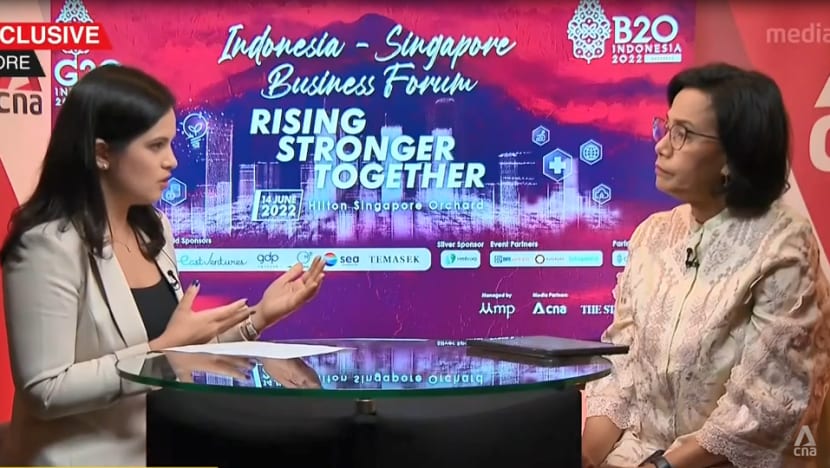Global economic recovery from COVID-19 overshadowed by food, energy supply disruptions: Indonesian finance minister
Sri Mulyani Indrawati says that Indonesia’s fiscal policy will need to be flexible as the recovery process is still “very fragile”.

Indonesia's finance minister Sri Mulyani Indrawati speaks to CNA in an exclusive interview on the sidelines of the Indonesia-Singapore Business Forum on Jun 14, 2022.
SINGAPORE: Global economic recovery from the COVID-19 pandemic has been overshadowed by food and energy supply disruptions, said Indonesia’s Finance Minister Sri Mulyani Indrawati on Tuesday (Jun 14).
In an exclusive interview with CNA, the minister said that the world, including Indonesia had expected a smooth and strong recovery from the pandemic. But this is not the case right now, she said.
“It’s not only due to the speed of recovery on the demand side, which is much faster than the supply side, but also the geopolitical tensions. The war in Ukraine is creating additional pressure, or in this case, disruptions to the energy and food (supply chains), including fertiliser,” she said on the sidelines of the Indonesia-Singapore Business Forum held in Singapore.
“And that creates what we call an inflation-driven recovery. That will complicate the policy choices in terms of how you are going to still continue maintaining this recovery usually through supporting fiscal, monetary and structural reform.”
She added that as inflation grows due to high commodity prices, this will complicate fiscal policy choices.
Therefore, some central banks have increased their interest rates, such as the European Central Bank and Federal Reserve, she said.
“And that has implications on growth … History also tells us that the increasing interest rate and tightening liquidity can create a potential financial crisis.
“That’s why the United Nations Secretary-General is now establishing this group which addresses both the food and energy (issues), and potential financial crises because after two years of the pandemic, many countries have very limited and narrow fiscal space,” she added.
Indonesia is the current president of the Group of 20 (G20), which comprises the world’s biggest economies.
Given the hurdles, Indonesia is remaining open-minded and prepared to adjust its policies, Mdm Indrawati said.
“So calibration, recalibration, is really required. This is also what the G20 is discussing … It is not like there is one template, dogmatic policy or direction but we have to really look at the data and what needs to be redesigned in terms of our policy.”
She noted that Indonesia is currently experiencing a commodity boom.
”So the revenue increases very, very strongly. While the spending will be allocated to the most important priorities.”
She outlined two current priorities for Indonesia. The first is to protect the people’s purchasing power when it comes to household consumption, which accounts for about 54 per cent of the country’s Gross Domestic Product, said the minister.
“The second is trying to continue supporting the momentum of the recovery, whether this is through investments or exports, which have now increased very dramatically because of the global recovery.
“And then, at the same time, we are trying to create a consolidation process for our fiscal policy, so our budget should become healthier with this commodity boom and scaling down the support because our household consumption has already recovered,” she noted.
Mdm Indrawati noted that Indonesia’s unemployment rate has dropped from 6.2 per cent last year to 5.8 per cent currently.
However, she said that the recovery process is still in its infancy and “very fragile".
Household consumption will depend on people’s purchasing power which is dependent on their income, she explained.
In order to ensure that inflation will not impact spending power, the government will continue to give and even increase subsidies, especially amid high fuel prices globally, she said.
“These are all (measures) how we try to combine between so many complex challenges, which overshadow the recovery process that is not smooth and simple,” she said, adding that Indonesia’s fiscal policy will need to be flexible as priorities change along the way.
“During the pandemic, our priorities were health and social safety net. During this food and energy shock, our priority is trying to protect the purchasing power of the people.”
When the pandemic began in 2020, Indonesia experienced its first recession in 22 years as its economy contracted by 2.07 per cent.
But it bounced back last year with a 3.69 per cent growth.
This year, the central bank projects economic growth to be between 4.7 per cent and 5.5 per cent.
In May, the country’s inflation rate was 3.55 per cent, the highest since December 2017. However, this was still within Bank Indonesia’s target range of between 2 per cent and 4 per cent.
Related:
PALM OIL EXPORT BAN WAS A DILEMMA FOR INDONESIAN GOVERNMENT
During the interview, the minister also defended Indonesia’s palm oil export ban.
Indonesia is the world's largest producer and exporter of palm oil. On Apr 28, the government imposed an export ban on crude and refined palm oil products after months of cooking oil shortage domestically.
The scarcity had resulted in the prices of the commodity ballooning by more than 70 per cent, which in turn affected the prices of food in Indonesia.
The government lifted the ban on May 23 as the average price of cooking oil began to decrease.
The minister noted that the export ban was a dilemma for the government.
She said: “Our decision definitely had a global implication. Our policymakers were faced with the difficult dilemma of protecting our own people but at the same time also not worsening the global situation.”
“And Indonesia is trying to find the exact right balance. That’s why the export ban has already been lifted. But in order for us to be able to guarantee that domestic consumers will get affordable cooking oil, there is a mechanism in place,” she said, referring to a domestic market obligation where firms have to reserve a share of their palm oil output for the local market.


















